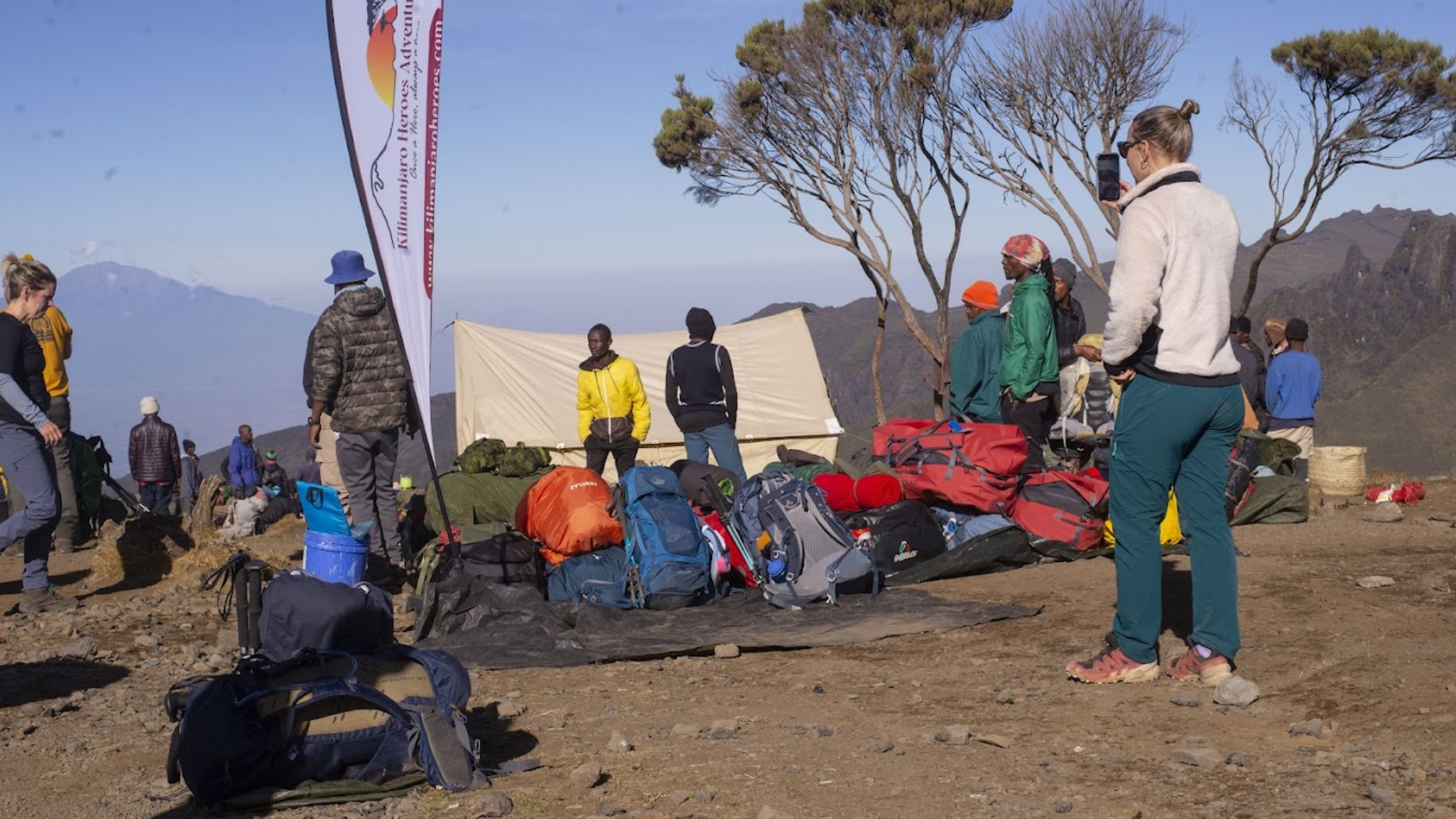Preparing for your Kilimanjaro trek requires careful consideration of what to pack. While this list doesn’t have to be followed to the letter, it covers all the essentials you’ll need. We understand that personal preferences vary, but following these guidelines will help ensure you don’t overlook anything crucial.
Remember: you can rent almost all of the gear from us. Just ask us for the rental pricelist.
Upper Body Clothing
- T-Shirts: Opt for Merino wool or synthetic fabrics (avoid cotton). Pack 2 short sleeve and 2 long sleeve shirts. Merino wool resists bacteria, staying odor-free longer, allowing you to bring fewer shirts.
- Waterproof Jacket: Choose a lightweight Gore-tex or similar material jacket with a hood. It’s essential for rain, snow, and wind protection, especially in the rainforest.
- Mid Layers: Pack one or two warm layers, like Merino Wool 200+ weight, fleece, or light down jackets.
- Heavy Down Jacket: An indispensable part of your gear for warmth during freezing temperatures. Opt for high-quality goose down with more down being the priority.
Lower Body Clothing
- Shorts: Bring one pair of lightweight shorts for lower elevations, made of nylon or synthetic fabric.
- Trekking Pants: Pack 1-2 pairs of quick-drying trekking pants. Consider zip-off options for versatile wear.
- Fleece Pants: Wear these warm fleece or track suit pants in the evenings at camp.
- Waterproof Pants: Essential for rain or heavy snow protection, especially in the rainforest.
Base Layers
Choose Merino wool or synthetic base layers. One pair of warm bottoms for summit night and one or two long sleeve tops for temperature regulation.
Hands and Feet
- Hiking Boots: Invest in warm, waterproof, comfortable boots with good ankle support. Break them in before the trip.
- Lightweight Shoes: For evenings at camp, opt for light trail running shoes or trainers.
- Socks: Pack Merino wool or synthetic socks to keep your feet dry. Include liner socks and thicker summit socks.
- Gloves: Bring waterproof outer gloves and liner gloves for extra warmth or less extreme temperatures.
Head and Neck
- Sun Hat: A brimmed hat for sun protection, covering ears, neck, and face.
- Winter Hat: Warm fleece or wool hat for cold temperatures, worn at night and during the summit.
- Buff/Neck Gaiter: Keep your neck warm and mouth covered.
- Sunglasses: Choose wraparound, category 3 or 4 sunglasses to shield against UV rays and ice-glare at higher altitudes.
Duffel Bag and Backpack
- Day Pack Backpack: Approximately 35 liters with hip belt and inner frame for daily essentials.
- Backpack Splash Cover: Protect contents from heavy rains.
- Duffel Bag/Kit Bag for Porters: A water-resistant 100-liter duffel bag carried by porters, not exceeding 15kg/33lbs.
Sleeping
- Sleeping Bag: A -15°C (0°F) rated sleeping bag for camping. Down is preferable.
- Thermarest: Self-inflating mattress for comfortable sleep in tents.
Protection from the Elements
- Sunscreen: Factor 50+ for high altitude sun protection, reapply often.
- Lip Balm/Zinc Cream: Essential for sun protection.
- Hand Sanitizer: Carry it at all times.
Hydration
- Water Bottles: Two Nalgene bottles for hot water and drinking. Avoid metal bottles.
- Camelbak: A 2-liter bladder system for hydration on the trail.
- Water Purification Tablets: Treat cold water on the trail.
- Vitamins/Powdered Drink: Add flavor to your water.
Staying Clean
- Towel: Quick-drying sports towel for daily washing.
- Wet Wipes: Essential for staying clean.
- Hand Sanitizer: Maintain hygiene on the trail.
Essential Tools
- Head Torch: Necessary for mornings, evenings, and summit night.
- Spare Batteries: Carry spares for head torch and camera.
Trail Munchies
Although meals are provided, bring personal snacks like energy bars or gels.
Miscellaneous Items
- Pocket Knife/Multi Tool: Handy but not essential.
- Trekking Poles: Adjustable poles for support.
- Gaiters: Optional but useful for keeping debris out of boots.
- Toilet Paper & Matches: For bathroom breaks on the trail.
- Garbage Bag: Protect clothes from rain and use for trail shoes.
- Small Mirror: Optional for personal use.
- Book/Diary: For downtime at camp.
- Camera: Extra memory cards and batteries, as charging isn’t possible.
- Cash: Bring USD for tips and extras in Arusha.
- Personal Toiletries: Daily essentials.
- Small Personal First Aid Kit: Essential medications and basics.
Remember, this is a guide; adjust it as needed. Your own personal items can be added to the kit.









Comment (0)